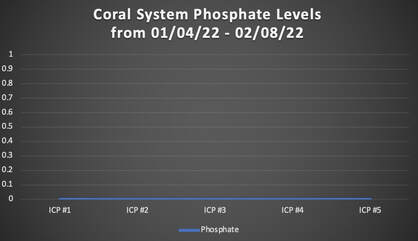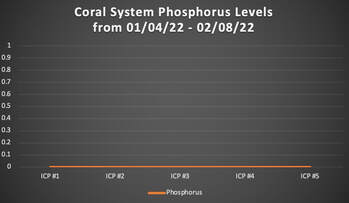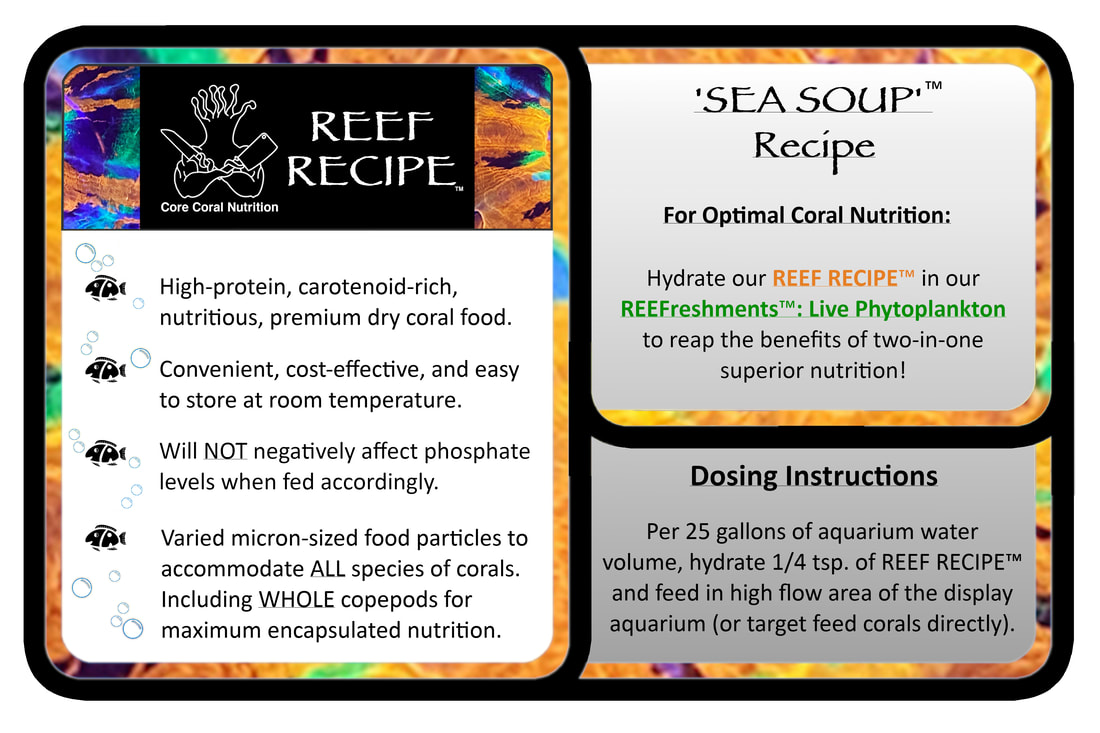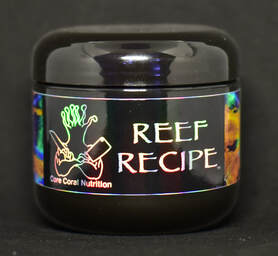|
When we released REEF RECIPE™ (our premium dry coral food) in December of 2021, we made the claim that when REEF RECIPE is fed according to our instructions (see the REEF RECIPE label on the jar or the REEF RECIPE website page), no negative phosphate (PO4) affects should be observed. This claim that we made at REEF RECIPE's product release was based off of data collected from feedings here at our aquaculture facility coupled with data collected from beta-tester reef aquariums. Phosphate parameters were measured with a combination of both Hanna and Salifert test kits. Data collected both on- and off-site confirmed that when dosed according to our instructions, REEF RECIPE had no significant effect on phosphate levels in aquaria. In recent months, we have taken our REEF RECIPE phosphate experiment a step further. While the data previously collected via Hanna and Salifert test kits is undeniably valuable, we wanted to run a new feeding trial here out our aquaculture facility in which we dosed REEF RECIPE and sent off weekly water samples for Inductively Coupled Plasma - Optical Emission Spectrometry (ICP-OES) analysis to get the most accurate phosphate readings possible. Our methods and results are outlined below. Our REEF RECIPE Phosphate Experiment and Method ProtocolThe Experimental System Our experimental trial began on 01/04/2022 and was conducted through 02/08/2022. The system selected for the experiment was one of our coral systems here at our aquaculture facility. This particular coral system is approximately 850 gallons, and it houses a variety of corals (including soft corals, LPS, and SPS corals). Feeding Protocol The experimental coral system was fed once daily at a consistent dosage of 8.5 teaspoons, strictly following the instructions listed on the REEF RECIPE jar and the REEF RECIPE website page. For our experiment, we chose to broadcast feed (rather than target feed) the REEF RECIPE. Once the REEF RECIPE was hydrated in water from our coral system, we dumped the solution into a high-flow area of the coral system (i.e., in front of an Ecotech Vortech powerhead) to be dispersed to the corals. Data Collection Two water samples were collected from the experimental coral system between the hours of 10:00am EST and 3:00pm EST every Tuesday during the experimental trial. These water samples were mailed off same-day for ICP-OES analysis by Reef*Labs in Bradenton, FL. Specifically, we were interested in the ICP-OES readings for phosphate (PO4) and phosphorus. Results
Discussion - Nutrition without excess Nutrients and NuisanceOver the almost seven years that Aquaholic Aquaculture has been in business, we have tried feeding our corals a variety of different dry food brands that are on the market, but we had never been able to find a brand of dry food that performed up to our standards. Specifically we wanted to find a nutritionally balanced dry food, that contained a variety of both phytoplankton and zooplankton, that incited a feeding response from our corals, and that did NOT degrade water quality (specifically, did NOT significantly increase our phosphate levels). The most common issue that we found with other dry coral food brands on the market was that (even when feeding according to the manufacturer's instructions), our phosphate levels sky-rocketed, resulting in an abundance of unsightly green hair algae (GHA) and recurring red slime (cyanobacteria) blooms in our coral systems. Tired of battling nuisance algae and chasing low phosphate levels that were impossible to achieve whilst feeding these other brands of dry coral food, we decided to formulate our own dry coral food that would be just as nutritious without compromising water quality: REEF RECIPE. When formulating REEF RECIPE, we took both nutrition and water quality into account, and worked to create a food that would be beneficial and nutritional for all types of corals without causing water degradation. Since switching to feeding REEF RECIPE at our aquaculture facility, we have had no issue maintaining a phosphate level of 0 ppm, our corals have never looked better, and all of our green hair algae and red slime issues have completely disappeared. The results of our experiments confirm that aquarists can feed REEF RECIPE without compromising water quality or incurring the wrath of unwanted nuisance algae. For aquarists looking for a dry coral food that provides superior nutrition without water degradation from excess phosphates, REEF RECIPE is the coral food for your aquarium. Try REEF RECIPE today!
0 Comments
The Benefits of Dry Coral FoodsThere are two main merits of dry coral foods: (1) Convenience and (2) Cost-Effectiveness. (1) Convenience Our REEF RECIPE is easy to store (room temperature is sufficient), it has a one-year shelf life, and it is simple to feed. It doesn't get any easier than opening a jar of REEF RECIPE, hydrating a scoop of food (with tank water, RO water, or live phytoplankton), and feeding it to your reef aquarium. (2) Cost-Effectiveness Let's be honest, live feeds can be costly. While we recommend that all reef aquariums are fed live feeds (live plankton is the foundation to every marine ecosystem!), supplementing your live feed regimen with a dry coral food is a great way to feed your reef economically. Formulating REEF RECIPE™We have been growing live feeds for almost nine years, and producing them commercially for the aquarium industry for over six years now. Our experience in growing live feeds has been key in formulating our new dry coral food. Identifying which plankton are best suited for a dry coral food coupled with an understanding of the nutritional elements required for comprehensive reef nutrition, are the foundation for crafting a perfect dry coral food recipe. After formulating and testing a number of different dehydrated plankton-based coral food combinations, we refined our dry coral food ingredients for optimal nutrition creating: REEF RECIPE. REEF RECIPE™ - Refined NutritionREEF RECIPE consists of augmented marine plankton (both phytoplankton and zooplankton). Our recipe is a high-protein, carotenoid-rich formula with essential amino acids, minerals, vitamins, omega fatty acids (PUFAs and HUFAs), and immunostimulants. REEF RECIPE is designed to not just feed your reef, but nourish it. Our recipe has been refined to maximize coral growth, coloration, and health. What Makes REEF RECIPE™ Special(1) Variety of Micron Sizes & Suitable for ALL Corals REEF RECIPE contains a variety of micron sizes to ensure that there are appropriately sized food particles for every type of coral in your aquarium. From the smallest polyp corals (SPS) to the largest (LPS), REEF RECIPE has them (and every size in between) covered. It is also a great food for soft corals, corallimorphs, anemones, and other suspension-feeders. (2) High Protein Ranking in with a minimum crude protein percentage of 58%, REEF RECIPE has one of the highest protein counts of dry coral foods on the market. In comparison, some other dry coral foods only have about 30% crude protein. (3) PUFAs and HUFAs Polyunsaturated fatty acids (PUFAs) and highly unsaturated fatty acids (HUFAs) are essential to marine organism health and development. Most dry coral foods on the market contain polyunsaturated fatty acids (PUFAs), but not all of them contain highly unsaturated fatty acids (HUFAs). REEF RECIPE contains both PUFAs and HUFAs for optimal nutrition. (4) Carotenoid-Rich Carotenoids are fat-soluble pigments responsible for the vibrant colors that we see in corals and fish. Of the carotenoids commonly valued for marine pigmentation, Astaxanthin (a red-pigmented carotenoid) is especially prized for its color-enhancing properties. When formulating REEF RECIPE, we included marine plankton that are naturally high in carotenoids (some with natural Astaxanthin counts of ~1500ppm), and then we further augmented these plankton with CAROPHYLL® (a reputable carotenoid additive). CAROPHYLL® is unique in that it contains impressively high Astantaxanthin levels (~10%). In comparison, NatuRose® (an Astaxanthin supplement commonly used in other dry coral foods because of its substantially lower cost) is only about 1.5% Astaxanthin. At Aquaholic Aquaculture, we don't believe in sacrificing nutrition to save a little money. By choosing to augment our plankton with CAROPHYLL®, we offer almost 7x more Astaxanthin in our product than competitors who choose to supplement with NatuRose®. (5) Whole Plankton When planktonic food is dehydrated and pulverized, some of the nutritional value is lost in the process. In REEF RECIPE, you can clearly identify WHOLE copepods in the mix. We intentionally chose to keep these copepods intact so that they could retain their encapsulated nutrition, providing maximum nutrition for your reef. Plus, these large whole copepods are the perfect sized food for your larger polyp corals. (6) Minimal Water Degradation A common issue with feeding dry coral foods is water degradation. Many coral foods on the market contain high phosphates, which can be detrimental to a reef aquarium when dosed in large quantities. We took water quality into account when formulating REEF RECIPE, and can attest that our coral food only minimally affects phosphate levels. When dosed according to our instructions (see the REEF RECIPE label on the jar or the REEF RECIPE website page), no negative phosphate affects should be observed. Try REEF RECIPE™ Today! |
Aquaholic BlogOur blog is dedicated to educating aquarium hobbyists about all-things-aquaculture, as well as sharing our aquatic adventures at Aquaholic Aquaculture® with fellow #Aquaholics Archives
February 2023
Categories |





 RSS Feed
RSS Feed